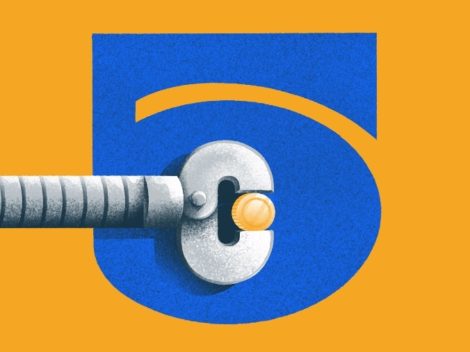There’s been much talk of a resurgent San Francisco with the new technology wave of artificial intelligence washing over the software world. Indeed, Crunchbase funding data as well as interviews with startup investors and real estate industry professionals show the San Francisco Bay Area has become the undisputed epicenter of artificial intelligence.
Last year, more than 50% of all global venture funding for AI-related startups went to companies headquartered in the Bay Area, Crunchbase data shows, as a cluster of talent congregates in the region.
Beginning in Q1 2023, when OpenAI’s ChatGPT reached 100 million users within months of launching, the amount raised by Bay Area startups in AI started trending up. That accelerated with OpenAI raising $10 billion from Microsoft — marking the largest single funding deal ever for an AI foundation model company. In that quarter, more than 75% of AI funding went to San Francisco Bay Area startups.
AI-related companies based in the Bay Area went on to raise more than $27 billion in 2023, up from $14 billion in 2022, when the region’s companies raised 29% of all AI funding.
From a deal count perspective, Bay Area companies raised 17% of global rounds in this sector in 2023 — making the region the leading metro area in the U.S. That is an increase over 13% in 2022.
The figure also represents more than a third of AI deal counts in the U.S., and means the Bay Area alone had more AI-related startup funding deals than all countries outside of the U.S.
Bay Area footprint
Leading Bay Area-based foundation model companies OpenAI, Anthropic and Inflection AI have each raised more than $1 billion — or much more — and have established major real estate footprints in San Francisco.
OpenAI has closed on 500,000 square feet of office space in the city’s Mission Bay district and Anthropic around 230,000 square feet in the Financial District.
“From a leasing standpoint, [AI] is the bright spot in San Francisco right now,” said Derek Daniels, a regional director of research in San Francisco for commercial real estate brokerage Colliers, who has been following the trends closely.
By contrast, “big tech has been pulling back and reassessing space needs,” he said.
According to Daniels, the city’s commercial real estate market bottomed out in the second half of 2023. While the San Francisco office space market still faces challenges, there is “quality sublet space which is also seeing some demand” for smaller teams, he said. And some larger tenants who have been out of the picture for office space of 100,000 square feet or more are starting to come back.
Center of gravity
Fifty percent of startups that graduated from the prestigious startup accelerator Y Combinator’s April batch were AI-focused companies.
“Many of the founders who came to SF for the batch have decided to make SF home — for themselves, and for their companies,” Garry Tan, president and CEO of Y Combinator, said in an announcement of the accelerator’s winter 2024 batch.
YC itself has expanded its office space in San Francisco’s Dogpatch neighborhood adjacent to Mission Bay. “We are turning San Francisco’s doom loop into a boom loop,” Tan added.
Of the batch 34 companies that graduated in March from 500 Global, another accelerator, 60% are in AI. Its next batch is closer to 80% with an AI focus, said Clayton Bryan, partner and head of the global accelerator fund.
Around half of the companies in the recently graduated 500 Global batch are from outside the U.S., including Budapest, London and Singapore. But many want to set up shop in the Bay Area for the density of talent, events and know-how from hackathons, dinners and events, he said.
Startup investors also see the Bay Area as the epicenter for AI.
“In the more recent crop of AI companies there is a real center of gravity in the Bay Area,” said Andrew Ferguson, a partner at Databricks Ventures, which has been actively investing in AI startups such as Perplexity AI, Unstructured Technologies, Anomalo, Cleanlab and Glean.
“The Bay Area does not have a lock on good talent. But there’s certainly a nucleus of very strong talent,” he said.
Databricks Ventures, the venture arm of AI-enhanced data analytics unicorn Databricks, has made five investments in AI companies in the Bay Area in the past six months. In total, the firm has made around 25 portfolio company investments since the venture arm was founded in 2022, largely in the modern data stack.
Moving back
Freed from in-person office requirements during the pandemic, many young tech workers decamped from the expensive Bay Area to travel or work remotely in less expensive locales. Now, some are moving back to join the San Francisco AI scene.
“Many young founders are just moving back to the Bay Area, even if they were away for the last couple of years, in order to be a part of immersing themselves in the middle of the scene,” said Stephanie Zhan, a partner at Sequoia Capital. “It’s great for networking, for hiring, for learning about what’s going on, what other products people are building.”
Coincidentally, Sequoia Capital subleased space to OpenAI in its early days, in an office above Dandelion Chocolates in San Francisco’s Mission District.
Zhan presumes that many nascent AI companies aren’t yet showing up in funding data, as they are still ideating or at pre-seed or seed funding, and will show up in future funding cycles.
Outside the Bay
While the Bay Area dominates for AI funding, it’s important to note the obvious: Much of that comes from a few massive deals to the large startups based in the region, including OpenAI, Anthropic and Inflection AI.
There is a lot of AI startup and research activity elsewhere as well, Zhan noted, with researchers coming out of universities around the globe, including École Polytechnique in Paris, ETH Zürich and the University of Cambridge and Oxford University in the U.K., to name a few. Lead researchers from the University of Toronto and University of Waterloo have also fed into generative AI technology in San Francisco and in Canada, Bryan said.
While the U.S. has a strong lead, countries that are leading funding totals for AI-related startups outside of the U.S. are China, the U.K., Germany, Canada and France, according to Crunchbase data.
London-based Stability AI kicked off the generative AI moment before ChatGPT with its text-to-image models in August 2022. Open source model developer Mistral AI, based in Paris, has raised large amounts led by Bay Area-based venture capital firms Lightspeed Venture Partners and Andreessen Horowitz.
And in China, foundation model company Moonshot AI based in Beijing has raised more than $1 billion.
Back to the Bay
Still, the center of gravity in the Bay Area is driven by teams coming out of Big Tech or UC Berkeley and Stanford University who have a “history of turning those ideas into startups,” said Ferguson.
The unique congregation of Big Tech companies, research, talent and venture capital in the Bay Area has placed the region at the forefront of AI.
“The valuation of the AI companies and some of the revenue by the top end of the AI companies is driving that population migration,” said 500 Global’s Bryan. At a recent AI event at Hana House in Palo Alto, California, he found it interesting that most people were not originally from the Bay Area. “Everyone now wants a direct piece or an indirect piece of that value that is going into AI.”
Related Crunchbase Pro query
Illustration: Dom Guzman

Stay up to date with recent funding rounds, acquisitions, and more with the Crunchbase Daily.









![Mar Calendar page being torn off to make way for Apr. [Dom Guman]](https://news.crunchbase.com/wp-content/uploads/mar-apr-2-300x168.jpg)
67.1K Followers